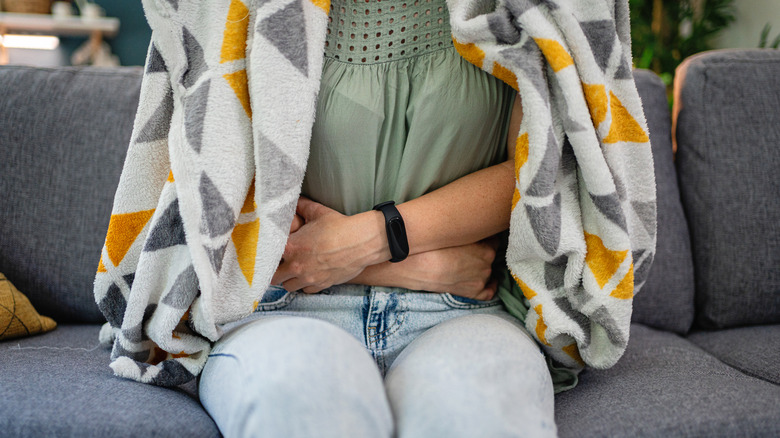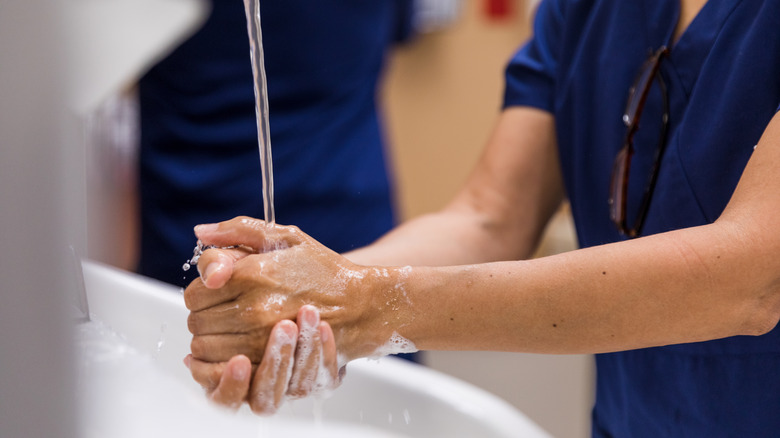This Simple Tip Is The Best Way To Steer Clear Of Stomach Bugs While Traveling
Traveling necessitates welcoming changes into your life — even the unpleasant ones. You often have to deal with jetlag, acclimate to unfamiliar and confusing cultures and customs, and attempt to wrap your tongue in an entirely different language. You may even find yourself adjusting to new bathroom habits, especially if you got hit by a bad case of "traveler's tummy." Unfortunately, experiencing indigestion, diarrhea, constipation, or worse, getting hit by a stomach bug is far too common for travelers. But you can dodge it all by doing one thing: being picky with what you eat.
While many use travel as an opportunity to indulge in a diverse array of dishes and delicacies of other locales, the tradeoff is you're also risking upsetting your stomach. If you can help it, it's better to err on the side of caution and steer clear of food that may potentially harbor bacteria, like raw fish and meat, and fresh produce. "We can't source where they came from, how long they've been out, and how they've been handled," registered dietitian Vanessa Rissetto shared with HuffPost, with food safety expert Mitzi Baum adding that fruits and veggies are "safest" if you've personally cleansed and peeled them. And those scrumptious-looking dishes in the buffet? Be skeptical of them, too, unless they've just been served and are still piping hot." So the food is too hot for you to initially bite into right when it comes to your plate," Dr. David Shlim, president of the International Society of Travel Medicine, told NPR. "That makes safe foods."
Washing your hands is also key
Ever heard of the stomach bug, err, virus called the norovirus? It's a highly contagious stomach virus that causes symptoms like diarrhea, nausea, stomach pain, and fever, and it's reportedly prevalent among travelers, especially cruise joiners. In 2023 alone, the CDC recorded more than a dozen outbreaks that occurred on cruise ships. "Norovirus clearly is an extraordinarily transmissible virus. It's said that it takes only about 10 viral particles, if you get them in your system, to initiate an infection," Dr. William Schaffner, a professor of infectious diseases at the Vanderbilt University Medical Center, explained to Healthline.
To avoid contracting it, keeping your hands clean is crucial, and no, your alcohol or sanitizer won't cut it, no matter how potent it claims to be. "Norovirus is one of the few viruses that doesn't get deactivated by alcohol. You actually need to use soap and water to physically destroy it and remove it from your hands," Dr. Luis Ostrosky, an infectious disease specialist at UTHealth Houston, shared with Today. Make it a ritual and be extra diligent about it, especially if you're going to be eating food, consuming beverages, and touching your face.
Oh, and don't just perform a casual rinse. Bernadette Boden-Albala, the director of the Program in Public Health at the University of California at Irvine, told The Washington Post that everyone should make it a point to wash their hands for 20 seconds at the minimum to get into all the crevices, under those nails, the spaces between your fingers, the works.
What to do if you get hit by a stomach flu
Sometimes, despite your best efforts to avoid catching stomach bugs, they can still strike. If you find yourself facing digestive woes during your trip, whether it's caused by the norovirus or other bacteria, the most important thing to do is to keep yourself hydrated. Given the potential for significant fluid loss, you need to counteract that by drinking water (not tap, please!) in small doses. "Take small sips so as to not overwhelm the body," Dr. Theresa Fiorito a pediatric infectious disease specialist, told Self. "Small sips ensure your body can use all that water without the kidneys getting overwhelmed and can process it without excreting what it doesn't need." It's also advisable to continue eating food, but it's best to stick with bland options like crackers, rice, and toast. They can help sustain energy without aggravating the stomach further.
But in case you find drinking or eating anything next to impossible, take it as a sign to consult a medical expert, as they may be able to prescribe you medication to ease your symptoms and decide on the best course of treatment. "If you can't keep water down after 24 hours, it's important to seek help," Dr. Jay-Sheree Allen, a Mayo Clinic family medicine physician, said. "If you are able to keep some things down, but your symptoms persist after 48 to 72 hours, it's also a wise idea to seek help from a medical professional."


